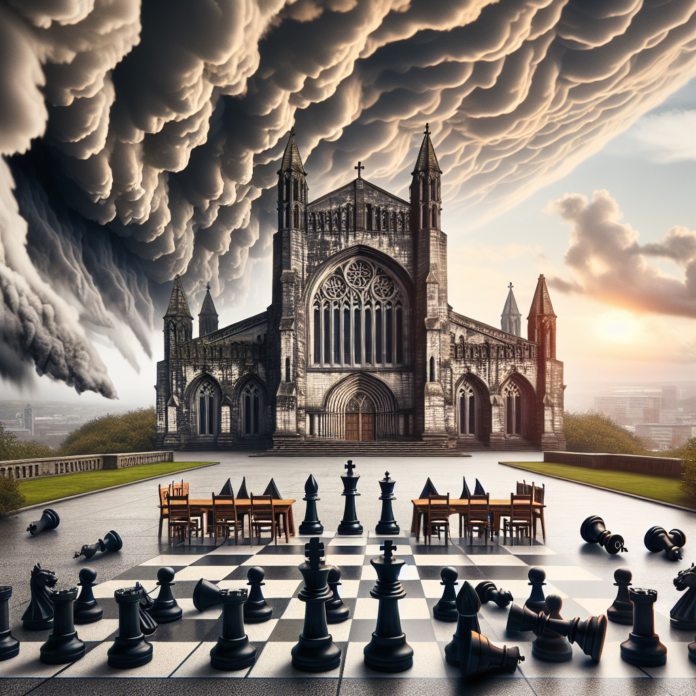In the intricate dance of religion and politics, few institutions hold as much historical sway as the Catholic Church. With over a billion adherents worldwide, the Church’s influence extends far beyond spiritual matters, seeping into the veins of political decision-making and societal shaping. Yet, amid this grandeur, a contentious debate rages about the role of the Church in politics. As the world grapples with unprecedented challenges, the risks of Catholic interference in political affairs have taken on a new urgency, especially with the rise of traditionalist factions that cling to outdated values.
Historically, the Catholic Church has played a formidable role in shaping political landscapes. Medieval Europe saw the Church exert enormous power, from the crowning of emperors to the excommunication of dissenters. The symbiotic relationship between the throne and the altar was so pervasive that it often blurred the boundaries between spiritual guidance and political coercion. However, the Enlightenment era and subsequent revolutions, such as the French Revolution in 1789, sought to curtail this influence. The separation of church and state became a pillar of modern democracies, a safeguard against the imposition of dogmatic rule.
Yet, remnants of ecclesiastical intervention persist in contemporary politics. Traditionalist factions within the Catholic Church often seek to assert their influence on political arenas, advocating for policies that may not align with progressive societal values. These factions, with their unwavering adherence to age-old doctrines and rituals—embodied vividly in the Latin Mass—tend to resist the tide of modernization and social justice that defines today’s progressive movements.
The Latin Mass, a symbol of staunch traditionalism, epitomizes this resistance. Its resurgence, often seen as a nostalgic yearning for the past, has reignited debates about the role of the Church in modern society. While the Latin Mass connects devotees to a rich heritage, it also anchors them to an era defined by rigid hierarchies and exclusionary practices. This attachment to tradition becomes particularly troubling when it bleeds into political advocacy, shaping policies that disregard the complexities of the modern world.
Consider the issue of LGBTQ+ rights—a paramount concern in contemporary human rights discourse. Progressive values advocate for inclusivity, equity, and the recognition of diverse identities. However, traditionalist Catholic factions often oppose these rights, rooted in a literal interpretation of biblical texts and centuries-old doctrines. This opposition not only hampers the advancement of social justice but also reinforces stigmas and discrimination, underlining a dissonance between progressive societal values and traditionalist religious rhetoric.
Pope Francis, often lauded as a beacon of progressive Catholicism, has taken significant steps to bridge this chasm. His papacy is marked by a refreshing openness to dialogue and a compassionate approach to marginalized communities. Francis’s emphasis on environmental stewardship, encapsulated in his encyclical "Laudato si’," underscores a holistic view of human dignity that transcends rigid dogma. His calls for economic justice, care for refugees, and a more inclusive Church resonate with progressive ideals, offering a blueprint for a faith that harmonizes with modernity.
Yet, Pope Francis’s progressive vision faces staunch opposition from conservative factions within the Church. These factions, doggedly clinging to the past, often undermine his efforts, promoting a version of Catholicism that appears increasingly out of step with the needs and realities of the contemporary world. The danger here lies not just in theological discord but in the tangible impact on political policies and societal norms.
In the United States, for example, conservative Catholic groups wield considerable influence in shaping policy debates on issues like abortion, contraception, and LGBTQ+ rights. These groups often align with broader conservative movements, forming powerful coalitions that advocate for restrictive laws based on religious doctrines. Such alliances threaten the foundational principle of secular governance, complicating the landscape of civil rights and personal freedoms.
Moreover, the intertwining of Catholic conservatism and politics is not confined to the U.S. In countries like Poland and Hungary, government policies increasingly reflect traditionalist Catholic values, from restrictions on abortion to opposition to LGBTQ+ rights. This conflation of religious dogma and political power jeopardizes democratic principles and human rights, illustrating the peril of divine interference in state affairs.
The path forward requires a conscious effort to disentangle religious orthodoxy from political governance. While the Catholic Church holds profound significance for millions, its role in shaping public policy must be tempered by a respect for pluralism and progressive values. Leaders like Pope Francis offer a hopeful vision of a Church that engages with the world not through imposition, but through dialogue and compassion.
In conclusion, the risks of Catholic interference in political affairs are multifaceted and far-reaching. While traditionalist factions within the Church cling to an era bygone, the contemporary world demands an embrace of progress, inclusivity, and justice. Pope Francis’s progressive vision provides a roadmap for a faith that respects tradition but also adapts to the evolving needs of humanity. As society navigates the complexities of the 21st century, a cautious approach to the entanglement of divine and human governance becomes not just preferable, but imperative.
